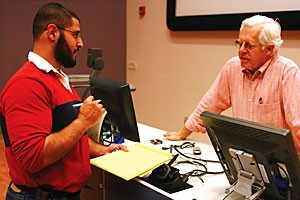Cyber criminals are plaguing the UA with fraudulent e-mails, infecting computers with viruses, installing information-tracking software and, in one case, causing an exam cancellation.
An unknown person sent out an e-mail to a cell biology course last week, claiming the instructor was ill and the class was canceled, students said.
The fraudulent e-mail was sent to the class at 10 a.m. Oct. 2, stating the exam ð- scheduled for 2 p.m. that day – was rescheduled for Oct. 4.
The exam was worth 15 percent of the final grade, and since 18 students believed the false cancellation e-mail, they missed the exam. As a result, the entire exam was thrown out, even for the students who took it, said Christina Jelly, a molecular and cellular biology senior.
The culprit was presumably a student in the course who was stressed out about the exam, overreacted and made a mistake, Jelly said.
“”It’s a slap in the face to every student in the class,”” said Dr. Charles Putnam, the abjunct instructor of the course.
In his written response to the class, Putnam said he had “”only contempt for the brazen, malicious act that disrupted the entire class.””
Amanda Peters, a pre-pharmacy junior, said she spent most of her weekend studying for the exam and believed she performed well on the test. Not only was she angry to learn that her results were thrown out, but she also felt bad for her professor, she said.
“”Anyone who upsets Dr. Putnam that much should be expelled, tarred and feathered,”” she said.
Peters described Putnam as “”a sweet, old man with a good grandpa persona. You could just see his heart breaking, and that would be enough for me to turn myself in.””
It is unlikely the perpetrator will be caught, despite the case being reported to the University of Arizona Police Department and the Dean of Students Office, said Kelley Bogart, the information security coordinator for the Center for Computing and Information Technology.
Bogart said it is possible to to use the e-mail to track down the IP address, which will show authorities which computer the perpetrator used.
“”Almost 10 times out of 10, (fraudulent emails) come from an open-access port,”” Bogart said.
However, sending the message from an open-access port, such as a computer in the Manuel T. Pacheco Integrated Learning Center, shrouds the sender in anonymity, Bogart stated.
The library has free access laws, but that doesn’t mean security precautions shouldn’t be taken, Bogart said.
The same tactics are used by cyber criminals “”phishing”” for information through e-mails specifically designed to mock legitimate businesses, such as Bank of America, PayPal or, the latest, the Arizona State Credit Union. Phishers recently targeted the Arizona-based bank, sending thousands of fraudulent e-mails to UA students, according to the CCIT Web site.
Cyber criminals employ a “”social engineering”” technique when cultivating personal information from computer users, Bogart said.
Social engineering is a tactic in which criminals use a sense of emergency or crisis, requiring the user to act immediately, Bogart said.
“”It uses human factors to compel end users to fall for the scam,”” Bogart stated.
Users will be asked to provide sensitive information such as user indentification, passwords and credit or debit card information, according to the CCIT Web site.
Students who come across these e-mails should report them to the company that is being defrauded, Bogart said.
Users should also beware of Spyware, which can be installed onto a computer without the user’s knowledge, Bogart said.
“”Spyware can be hidden in applications downloaded from the Web, and unless you have the latest antivirus and firewall software, you’re at risk,”” Bogart said.
Spyware can track everything typed on a keyboard and send it back to the cyber criminal without the user’s knowledge, Bogart stated.
Cyber crime is growing rapidly and cyber criminals can be anywhere and anonymous, Bogart said.
Computer crime can be considered the new pirate frontier, Bogart said.
“”Why do one-on-one scams when you can rip off millions at once?”” Bogart said.
Bogart said there are several precautions users can take to protect themselves, such as downloading the latest free antivirus and firewall programs offered to UA students at www.sitelicense.arizona.edu.
However, those measures still could not protect the students in the cell biology course, who will have another exam Oct. 20. Students said the exam will cover material from the nullified exam in addition to new information.
“”I think it is unfair to those of us who studied really hard for the test,”” said Kathryn Sink, a general biology junior, in an e-mail. “”I think that the perpetrator did win. The whole goal of the e-mail must have been to either get an extension on study time or to completely cancel the test. I think the perpetrator should be expelled for this.””









